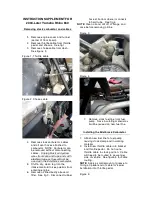
WARNING:
Do not drive the vehicle when the third row seat is
rotated backwards. During a sudden stop, the safety belts are
not functional in this position, and during a sudden stop, the third row
seat can rapidly tip back to the forward position, all of which may
result in serious injury.
SAFETY RESTRAINTS
Personal Safety System
姞
The Personal Safety System
威
provides an improved overall level of
frontal crash protection to front seat occupants and is designed to help
further reduce the risk of airbag-related injuries. The system is able to
analyze different occupant conditions and crash severity before activating
the appropriate safety devices to help better protect a range of
occupants in a variety of frontal crash situations.
Your vehicle’s Personal Safety System
威
consists of:
•
Driver and passenger dual-stage airbag supplemental restraints.
•
Front outboard safety belts with pretensioners, energy management
retractors (first row only), and safety belt usage sensors.
•
Driver’s seat position sensor.
•
Front passenger sensing system
•
“Passenger airbag off” or “pass airbag off” indicator lamp
•
Front crash severity sensor.
•
Restraints Control Module (RCM) with impact and safing sensors.
•
Restraint system warning light and back-up tone.
•
The electrical wiring for the airbags, crash sensor(s), safety belt
pretensioners, front safety belt usage sensors, driver seat position
sensor, front passenger sensing system, and indicator lights.
How does the Personal Safety System
姞
work?
The Personal Safety System
威
can adapt the deployment strategy of your
vehicle’s safety devices according to crash severity and occupant
conditions. A collection of crash and occupant sensors provides
information to the Restraints Control Module (RCM). During a crash, the
RCM activates the safety belt pretensioners and/or either one or both
stages of the dual-stage airbag supplemental restraints based on crash
severity and occupant conditions.
2009 Flex
(471)
Owners Guide, 2nd Printing
USA
(fus)
Seating and Safety Restraints
175
















































